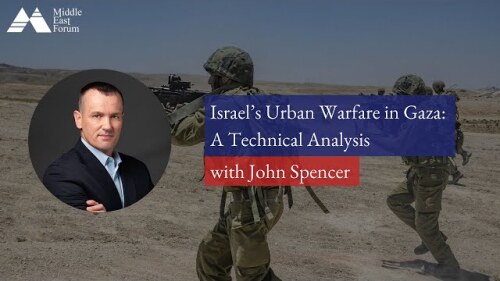Dan Schueftan, head of the International Graduate Program in National Security at the University of Haifa, spoke to participants in a September 14 Middle East Forum webinar (video) about the conflict between Islamic radicalism and those threatened by it in the Middle East, and its impact on American policy in the region.
For many years the American response to radicalism in the Middle East was “counter-productive,” said Schueftan. The administration of George W. Bush promoted democratization in hopes of “fixing the Middle East,” while the Obama administration tried appeasement of the radicals. These approaches failed. Islamic radicalism, both Sunni and Shiite, became more dangerous, embodied in the regional hegemonic ambitions and growing power of Turkey and Iran, respectively.
“Trump understands much better what is happening in this region,” namely that “supporting your allies and ... trying to undermine and to break your enemies is what works.”
Schueftan listed the “bad guys” in the region as Iran, Turkey, Syria, Qatar, Hamas, and Hezbollah. The “good guys,” consisting of “those who are afraid of Iran and those who are afraid of Turkey,” are Israel, Saudi Arabia, the Gulf States, Jordan, and Morocco on the one hand, and Cyprus and Greece on the other. “The better the relations inside this [group] ... the stronger it is against the threats of Iran and Turkey.”
The Trump administration’s negotiation of the September 2020 “Abraham Accords” greatly checked Iran’s ambitions. |
The emerging coalition between Israel, the United Arab Emirates, Bahrain, and others brokered by the Trump administration has greatly checked Iran’s ambitions. The Gulf Arabs now understand that Israel is the “only regional element that has a strong enough motivation to fight Iran” and “can be trusted because it must fight Iran for its own good.”
However, Schueftan believes the “one major mistake” in the Trump administration’s Middle East policy is its underestimation of the danger of Turkey, which he suggests is “going in the direction of a totalitarian regime” under President Recep Tayyip Erdoğan. Not only is Turkey projecting its military power, notably in Syria and Libya, but it is sponsoring the Muslim Brotherhood, which has a presence throughout the Arab world. “The Muslim brothers are extremely dangerous because they have learned to pretend to be moderate ...They are as radical as you can possibly get, but smart enough to hide it.”
Schueftan strongly recommends “persisting with the existing [U.S.] policy of maximum pressure on Iran” and “supporting local allies” against it, and he believes the same two-fold approach should be applied to Turkey. This means “see[ing] to it that Erdoğan’s economy is undermined ... once he is economically challenged, he may lose a lot of support in Turkey.” It means not only “backing the Greeks and the Cypriots against the Turkish attempt to dominate the Eastern Mediterranean,” but also supporting the Kurds.
“Anything that the Iranian regime agrees to is ipso facto bad and dangerous for the other side.”
Trying to reach an accommodation with either Iran or Turkey is a bad idea in Schueftan’s view. “Anything that the Iranian regime agrees to is ipso facto bad and dangerous for the other side, if they agree to something, it means that we have been given a raw deal.” The same zero-sum principle applies to Turkey. “Whatever is bad for Erdoğan, I think is good for the region.”





